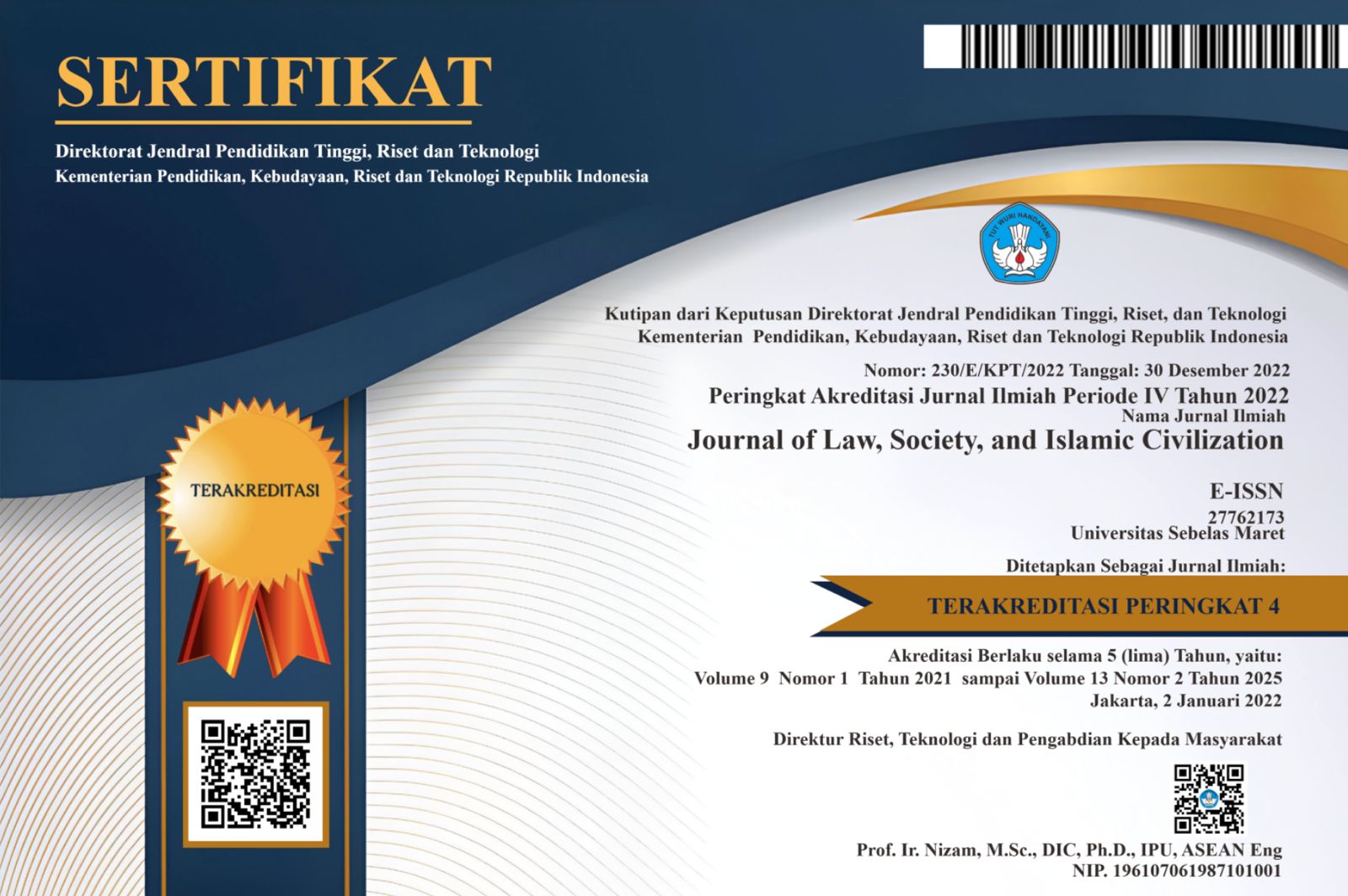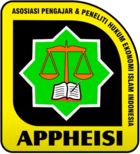Pertimbangan Hakim dalam Perluasan Wasiat Wajibah di Luar Ketentuan Kompilasi Hukum Indonesia
Abstract
This study analyzes judicial considerations in expanding the mandatory bequest (wasiat wajibah) beyond Article 209 of the Compilation of Islamic Law (KHI), which limits it to adoptive children or parents, through a case study of Religious Court Decision No. 375/Pdt.P/2023/PA.Gtlo, issued September 8, 2023, by Judge Drs. Syufudin Mohamad, MH. The ruling designates the deceased Yusuf Jantu bin Njdjulu Jantu's (died July 15, 2023) wife as primary heir, sibling descendants as substitutes, and Applicants 2 (Yeni Yantu), 7 (Olin Yantu), and 8 (Citra Dewi Kau) as recipients based on significant social-moral ties, verified by witness testimony under Article 173 KHI. The research addresses key issues: how judicial considerations influence wasiat wajibah application, the legal bases employed, and implications for legal certainty and justice in Islamic inheritance law.
Using normative legal research with qualitative analysis, statute and case approaches, primary sources (court decision, KHI), and secondary literature, results show judges use flexible ijtihad to accommodate modern family dynamics and administrative asset management without disputes. Legal bases include Articles 174 and 209 KHI, Supreme Court Circular No. 03/2015, jurisprudence like No. 10K/Pdt/2016, and fiqh references such as Bughyatul Mustarsyidin, aligning with precedents (e.g., Nos. 368K/AG/1995, 489K/AG/2011, 2/Pdt.G/2011/PA-Kbj, 268/Pdt.P/2020/PA.Amb) handling religious pluralism and non-conventional ties, capped at one-third of assets. This expansion ensures justice Aristotelian distributive (proportional to contributions), Rawlsian (protecting disadvantaged without harming primaries), Al-Attas' 'adl (harmonious fitrah placement preventing zulm), and maqasid shariah (hifz al-mal and hifz al-nasl for welfare) fostering social harmony in pluralistic Indonesia. However, unclear criteria risk inconsistency and uncertainty, relating directly to the queried issues by highlighting progressive innovation alongside needs for KHI revisions (inclusive emotional/economic bonds), judicial training, public education, and digital verification to sustain procedural, distributive, and sharia justice.
Keywords
Full Text:
PDFReferences
Afifuddin, M., & Zahid, M. (2025). Maqashid Syariah in the Companions and Tabi ’ in Period. 2(2), 1–5. https://doi.org/https://doi.org/10.62951/ijlcj.v2i2.557
Ahmad, A. Z. (2018). Wasiat Wajibah dalam Perspektif Hukum Positif dan Hukum Islam : Analisis Maqāṣid asy-Syarī’ah Jasser Auda. Asy-Syir’ah: Jurnal Ilmu Syari’ah Dan Hukum, 52(1), 55–73. https://doi.org/https://doi.org/10.14421/ajish.v52i1.945
Al-Attas, S. M. N. (2015). On Justice and the Nature of Man: A Commentary on Surah Al-nisa (4):58 and Surah Al-mu’minun (23):12-14. IBFIM. https://books.google.co.id/books?id=9a7rswEACAAJ
Al Faritzi, M. R., & Herlambang, M. G. (2025). Syed Muhammad Naquib Al-Attas ’ Concept Of Justice In Addressing Gender Equality Issues. 4(2), 481–495. https://doi.org/https://doi.org/10.61630/crjis.v4i2.117
Christian, A., Nabilah, A., & Ajie, S. (2025). Teori Keadilan Menurut Jhon Rawls. Jurnal Konstitusi, 6(1), 140. https://journalversa.com/s/index.php/jhm/article/view/865
Duta Pratama, F., Rafly Pebriansya, & Pratama, M. A. (2024). Konsep Keadilan dalam Pemikiran Aristoteles. Praxis: Jurnal Filsafat Terapan, 1(2), 1–25. https://doi.org/10.11111/praxis.xxxxxxx
Dutta, S. (2017). Rawls’ Theory of Justice: an Analysis. IOSR Journal of Humanities and Social Science, 22(4), 40–43. https://doi.org/10.9790/0837-2204014043
Efendi, J., & Ibrahim, J. (2018). Metode Penelitian Hukum Normatif dan Empiris. Kencana.
Hadi, S. (2017). PEMBATASAN WASIAT SEBAGAI BENTUK KEADILAN HUKUM ISLAM. Al-Ahwal: Jurnal Hukum Keluarga Islam, 9(2), 169–184. https://doi.org/10.14421/ahwal.2016.09203
Hasanah, U., Ananda Arfa, F., & Nurasiah. (2025). TRANSFORMASI HUKUM WARIS DALAM PERSPEKTIF FILSAFAT HUKUM ISLAM. Journal of Science and Social Research, 8(1), 604–609. https://doi.org/https://doi.org/10.54314/jssr.v8i1.2755
Khaiyyul Millati Waddin, A. H., & Ashari, B. (2025). INTEGRASI KONSEP PEWARIS, AHLI WARIS, HARTA WARIS, DAN MAWĀNI’ AL-IRTS DALAM KERANGKA KEADILAN DISTRIBUSI WARISAN ISLAM. Mabahits : Jurnal Hukum Keluarga Islam, 6(01), 43–53. https://doi.org/10.62097/mabahits.v6i01.2218
Kurniawan Akbar, A. (2019). PENGATURAN WASIAT WAJIBAH TERHADAP ANAK ANGKAT MENURUT HUKUM ISLAM. AL IMARAH : JURNAL PEMERINTAHAN DAN POLITIK ISLAM, 4(1), 1. https://doi.org/10.29300/imr.v4i1.2193
Levin, N., & Davies, B. (2019). “John Rawls and the ‘Veil of Ignorance.’” In Introduction to Ethics: An Open Educational Resource. In N. Levin (Ed.), Introduction to Ethics: An Open Educational Resource (pp. 92–97). NGE Far Press.
Mamonto, W. I., Timomor, A., & Palempung, L. W. (2025). Kajian Hukum Waris Anak Angkat Dalam Perspektif Hukum Islam. Inovasi : Jurnal Sosial Humaniora Dan Pendidikan, 4(3), 279–286. https://doi.org/https://doi.org/10.55606/inovasi.v4i3.4279
Marzuki, P. M. (2017). Penelitian Hukum Edisi Revisi. Kencana.
Nashirun, N., Kurniati, K., & Marilang, M. (2022). KONSEP KEADILAN DAN KESETARAAN GENDER TENTANG PEMBAGIAN HARTA WARIS DALAM PERSFEKTIF HUKUM ISLAM. Madani Legal Review, 6(1), 65–78. https://doi.org/10.31850/malrev.v6i1.1708
Rohana, N. P. (2021). WASIAT WAJIBAH DALAM PERSPEKTIF HUKUM DI INDONESIA. Jurnal Hukum Ekonomi, 7(1). https://doi.org/http://dx.doi.org/10.24952/yurisprudentia.v7i1.4015
Sari, M., & Asmendri. (2020). Peneltian Kepustakaan (Library Research). NATURAL SCIENCE; Jurnal Penelitian IPA Dan Pendidikan IPA, 6(1), 41–53.
Syahrul Mubarak. (2020). WASIAT WAJIBAH DAN IMPLEMENTASINYA TERHADAP HUKUM KELUARGA DI INDONESIA. Comparativa: Jurnal Ilmiah Perbandingan Mazhab Dan Hukum, 1(2), 76–94. https://doi.org/10.24239/comparativa.v1i2.14
Yasmine, A., Aqilah Ramadhoifah, H., & Rista Afifah, A. (2024). PERADILAN AGAMA SEBAGAI LEMBAGA PENEGAK HUKUM ISLAM DI INDONESIA. Sriwijaya Journal of Private Law , 1(1), 83–90. https://doi.org/https://doi.org/10.28946/sjpl.v1i1.3373
Refbacks
- There are currently no refbacks.












